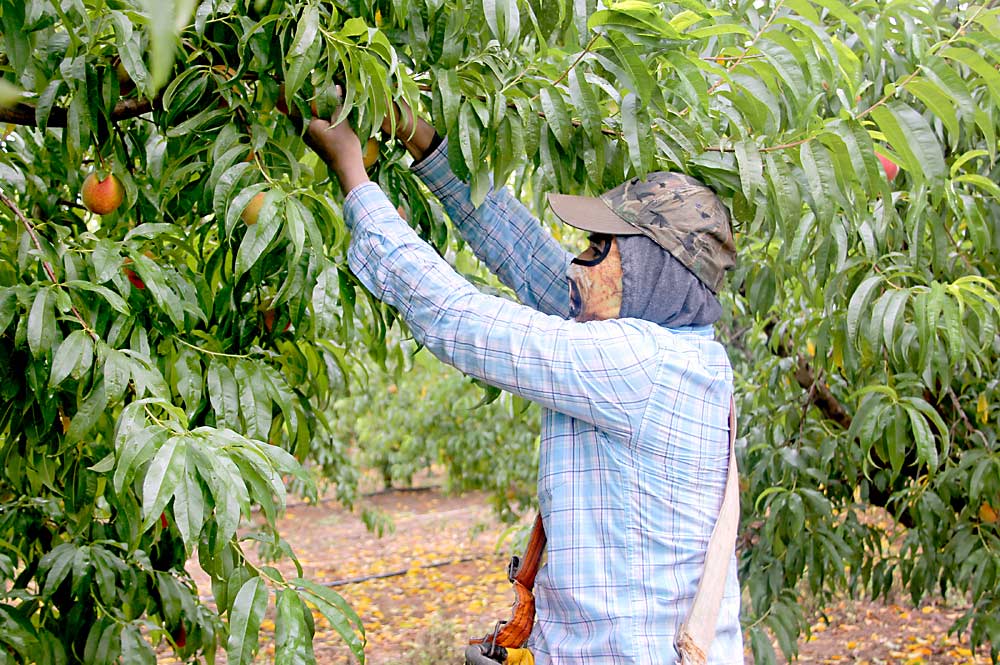
Two dramatic “acts of God” this spring led peach growers separated by half a continent to work out a labor deal.
Western Colorado had a spring freeze that cut peach production significantly, leaving H-2A employees at two family farms without enough work. Meanwhile, visa restrictions due to the coronavirus left a South Carolina farm that relies on contracted Mexican laborers short staffed.
Fortunately, it’s a small peach world.
“I have friends out there,” said Chalmers Carr, president of Titan Farms of Ridge Spring, South Carolina, one of the largest peach producers in the United States.
Among them is Charlie Talbott, president of Talbott Farms in Palisade, Colorado. On the morning of April 14, a harsh cold event killed most of his peach crop this year.
Talbott typically brings H-2A workers to his farm on two contracts, one running February through October, the other for peak harvest season from late July through September.
The harvest contract he canceled, but he felt bad for the workers on the longer contract who were already in the United States. H-2A regulations include a “contract impossibility” clause that allows employers to terminate a contract if weather, fire or some other act of God makes it impossible for them to continue employing the workers. But he didn’t want to pull that string, he said. Nearby growers of fruit, melons or corn couldn’t take the workers, either.
“We hated to have this be a financial and logistical loss for them, as well,” Talbott said.
About the same time, 1,800 miles to the east, the coronavirus created uncertainty over border crossings and led the U.S. State Department to cut back on visa processing. At first, the U.S. Consulate in Monterrey, Mexico, shut down completely, but by mid-April it had resumed some visa activity, offering to waive in-person visa interviews for returning H-2A workers.
That helped, but Titan Farms was expecting some new contracted workers this year, leaving the company facing a potential labor shortage.
So, the two cross-country friends agreed to transfer the workers from Colorado to South Carolina. On April 26, a total of 41 workers from Talbott Farms and nearby C & R Farms loaded buses in Palisade for the 26-hour drive over the Rocky Mountains, the Great Plains, the Mississippi River and the Appalachian Mountains to Titan Farms in South Carolina to help Carr complete the harvest.
Response to the coronavirus
The maneuver was just one example of how the nation’s farm workforce infrastructure has been pivoting during the pandemic.
Transfers have been allowed under H-2A contracts for years, long before the coronavirus. Normally, they happen within a state or growing area, just because of travel costs, but the paperwork is tremendous, said Kerry Scott, the program manager for MasLabor, a Virginia-based seasonal labor facilitator. Neither of the farms in this transfer were MasLabor clients.
However, in light of the coronavirus, federal government agencies helped facilitate transfers this year. The U.S. Department of Labor and the U.S. Department of Agriculture teamed up to create a database of nearly 54,000 H-2A workers already in the U.S. who could be available for transfer when their contracts expired.
In mid-April, the Department of Homeland Security set temporary rules that allowed employers to hire foreign workers already in the United States, as soon as the department received the H-2A petition, if those growers were worried contracted workers would be unable to enter the country due to travel restrictions. Homeland Security also temporarily allowed H-2A workers to stay beyond the normal three-year maximum.
The U.S. Department of Labor also granted a host of temporary regulatory relaxations in late March and early April, including extending filing deadlines, allowing alternate housing for workers and permitting employers to assign workers to jobs and worksites not specifically listed on the job order.
Normally, those are big no-no’s, Scott said. But federal authorities understood that the normal concentrated housing densities of H-2A camps presented a public health risk, so they allowed growers to amend their applications for alternatives to spread people out. State health authorities still have to greenlight those other housing facilities.
Mexico’s federal government adjusted, too, Scott said, extending in absentia passports of workers already in the U.S. who would normally be required to visit a Mexican consulate.
Meanwhile, Scott advises his employer clients to discourage their H-2A workers from traveling to their home countries during downtimes on the farm this season, to avoid having them stuck if travel restrictions are imposed. In Washington, for example, some workers take a vacation between cherry and apple harvests. If workers need to or insist on visiting home, Scott suggests trying to convince them to stagger their trips, so not all of them get stuck out-of-country at one time.
Meanwhile, employers who typically contract workers from Guatemala, Nicaragua and Jamaica may want to keep their eyes open for alternative labor pools from Mexico, Scott said. Mexico has been allowing workers to travel to the U.S., but the other H-2A participating countries have stricter restrictions.
Scott hopes the U.S. government will leave some of the relaxed rules in place after the pandemic, in the name of efficiency.
“This whole emergency may prove that we don’t have to be so restrictive after the virus has come and gone,” he said. •
—by Ross Courtney







Leave A Comment